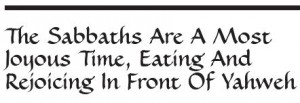[This is part of a longer post revisited every year during the fall feasts: REVISIT: How now do we observe “My” feasts? Because of the length of such posts that cover so much ground in one reading, it helps to select and reprint excerpts for easier and shorter reading.
It appears the Sabbath of YHWH is an inexhaustible topic because many are still unclear about this 4th commandment, when and how to apply it to life in these times of religious confusion. So we address all questions that keep coming our way in our uniquely Sinaite thinking and understanding of the Sabbath. Are we correct in our conclusions? As we always do, we leave it up to our readers to decide. After all, we present our case based on our reading, study, understanding and long discussions among kindred spirits with differing views. For Gentiles such as ourselves, we have made our conclusions regarding the Sabbath.–Admin1]
—————————
The weekly Sabbath was instituted as a feast for all created humanity to remember Who is the Creator, as early as Bereshiyth/Genesis 2:1-3:
[EF] 1 Thus were finished the heavens and the earth, with all of their array.
2 God had finished, on the seventh day, from all his work that he had made.
3 God gave the seventh day his blessing and he hallowed it, for on it he ceased from his work, that by creating, God had made.
[RA] Then the heavens and the earth were completed, and all their array. And God completed on the seventh day the task He had done, and He ceased on the seventh day from all the task He had done. And God blessed the seventh day and hallowed it, for on it He had ceased from all His task that He had created to do. This is the tale of the heavens and the earth when they were created.
Every time the Sabbath is celebrated, it brings the celebrants back to Creation week, when the Sabbath itself was ‘created’ so to speak, and set apart (sacred, holy, sanctified) to make it different from other days. To observe the Sabbath is to give tribute to the Lord of the Sabbath Who is also Creator of all that exist.
Before there was Israel, there was the Sabbath.
Before the giving of the Torah on Sinai, there was the Sabbath.
On the way to Sinai, Israel’s God trained the mixed multitude to observe the seventh day by teaching them to take two day’s portion of manna on the 6th day, so that they could rest on the 7th:
[AST] Exodus 16: 4-5 HASHEM [YHWH] said to Moses, “Behold!—I shall rain down for you food from heaven; let the people go out and pick each day’s portion on its day, so that I can test them, whether they will follow My teaching or not. And it shall be that on the sixth day when they prepare what they bring, it will be double what they pick everyday.
25-30 Moses said, “Eat it today, for today is a Sabbath for HASHEM [YHWH] ; today you shall not find it in the field. Six days shall you gather it, but the seventh day is a Sabbath, on it there will be none. It happened on the seventh day that some of the people went out to gather, and they did not find. HASHEM [YHWH] said to Moses, “How long will you refuse to observe My commandments and My teachings? See that HASHEM [YHWH] has given you the Sabbath; that is why He gives you on the sixth day a two-day portion of bread. Let every man remain in his place; let no man leave his place on the seventh day.” The people rested on the seventh day.
The Sabbath is experientially taught to the mixed multitude; they did not have to “leave” their place on the seventh day, only because they were supposed to have already gathered their double portion of manna the day before. Some observant Jews (because they ARE of Israel) take this to mean they do not leave their homes on the Sabbath; well, this is in their national experience and they are probably playing safe by applying it to themselves even today.
Finally on Sinai, the 10 “Words” were inscribed on tablets of stone and the 4th was the Sabbath . . . it officially became Law:
[AST] Shemoth/Exodus 20:8-11
Remember the Sabbath day to sanctify it. Six days shall you work and accomplish all your work; but the seventh day is Sabbath to HASHEM [YHWH], your God; you shall not do any work—you, your son, your daughter, your slave, your maidservant your animal, and your convert within your gates—-for in six days HASHEM [YHWH] made the heavens and the earth, the sea and all that is in them, and He rested on the seventh day. Therefore, HASHEM [YHWH] blessed the Sabbath day and sanctified it.
Later as Israel fails to live up to the Torah and is warned by prophet after prophet to mend its ways and return to YHWH, Isaiah [58:13-14] adds this:
If you restrain your foot because it is the Sabbath; refrain from accomplishing your own needs on My holy day; if you proclaim the Sabbath a delight, and the holy [day] of HASHEM [YHWH] ‘honored,’ and you honor it by not engaging in your own affairs, from seeking your own needs or discussing the forbidden—then you will delight in HASHEM [YHWH], and I will mount you astride the heights of the world; I will provide you the heritage of your forefather Jacob, for the mouth of HASHEM [YHWH] has spoken.
And still speaking to Israel, the universal scope of Sabbath observance is emphasized:
[56:1-8]
Thus said HASHEM [YHWH]: Observe justice and perform righteousness, for My salvation is soon to come and My righteousness to be revealed. Praiseworthy is the man who does this and the person who grasps it tightly: who guards the Sabbath against desecrating it and guards his hand against doing any evil.
Note vs. 3:
Let not the foreigner, who has joined himself to HASHEM [YHWH], speak, saying, ‘HASHEM [YHWH] will utterly separate me from His people’; and let not the barren one say, ‘Behold I am a shriveled tree.’ For thus said HASHEM [YHWH] to the barren ones who observe My Sabbaths and choose what I desire, and grasp My covenant tightly: In My house and within My walls I will give them a place of honor and renown, which is better than sons and daughters; eternal renown will I give them, which will never be terminated.
And vs.6:
And the foreigners who join themselves to HASHEM [YHWH] to serve Him and to love the Name of HASHEM [YHWH] to become servants unto Him, all who guard the Sabbath against desecration, and grasp My covenant tightly—I will bring them to My holy mountain, and I will gladden them in My house of prayer; their elevation-offerings and their feast-offerings will find favor on My Altar, for My house will be called a house of prayer for all the peoples.
That clear, how now does a gentile observe the Sabbath?
If you check out the Jewish observance, they have their traditional ways— from the welcoming of the “queen of days” on “erev shabbat” or Friday sundown, to saying goodbye at “havdalah” or Saturday sundown. Some go to extremes, observant Jews are meticulous as they feel they should be. The Jewish websites on our link are full of instructions but remember, Jews write for Jews, not for gentiles.
What about us . . . non-Jews?
Gentiles of other faiths have their Sunday service, or Friday service, some on Thursday, and the Christian sect that calls itself Messianic Judaism “church” on Saturday and sound so Jewish in their service you would think you were in a synagogue.
Sinaites have trailblazed in many ways as you will realize when you read through our category “Sinai 6000” so we figured , why not design our own Sabbath celebration, borrowing from Jewish tradition but with our own unique liturgy.
So for now, our Sinaite core group have decided on the following, realizing we function as the world does, on a Sunday-day-off system:
- The essence of the Sabbath is to spend the day fully concentrating on YHWH and His Torah, and the very reason for the Sabbath: rest.
- We obey the command to “cease” from doing what we normally do six days a week,
- that is, as much as it is possible for us to do so in a Sunday-world-system when some of us have jobs that require us to work on the Sabbath.
- We welcome the sabbath on ‘erev’ like the Jews do, either individually, with family, or with community.
- We take our 6-8 hours sleep the rest of that evening.
- Those of us who don’t work spend Saturday AM hours in study, prayer, devotional time.
- Those of us who work take our noon lunch-hour off to worship together and read Torah; we figure we’ve already observed 16 hours of the Sabbath as best as we could within the Sunday system we are caught in; we dedicate our work-hours ever-conscious of our Creator God and grateful for all He has done for us the past week, if not for all of our lifetime.
- Those of us who are free all day come together (Saturday PM hours) to a fellowship meal and study Torah together; regarding this —- we’ve been made conscious by a Jewish friend that all we’ve done is move our Sunday activities to Saturday, but we find nothing wrong with coming together because our God is the God of the Sabbath, and because we do not see each other all week so what better day to enjoy one another than His appointed day?
- When we break up at ‘havdalah’ like the Jews, we say goodbye to the Sabbath and look forward to the next.
We ‘delight’ in the Sabbath because He declares it as an “appointment” with Him. So instead of finding it as a restrictive day where we can’t do anything “as usual”, it is a day to enjoy the blessings of a ‘date’ with YHWH, and do whatever we can to honor Him and HIs day. It is “My” appointed time when He commits Himself to meeting with Sabbath-keepers . . . and so we meet with Him individually, with family, with community.
Think of it this way: someone you truly love who loves you back sets an appointment day/time to meet you every week. He specifies one day, let’s just say Saturday and no other day. He commits himself to meeting you at the appointed agreed-upon day of each week. So he shows up as he expects you to do the same. You decide no, you’d rather meet him on Sunday or maybe Friday, or any other day. Well, he won’t be there on the day of your choice, he says only on this day every week. You’re stubborn, you keep changing because his day is not convenient for you. Well then, you will never get to meet with him. Trivial, probably bad example, but easy to understand if you got the point.
Okay, so that settles the Sabbath, at least for us Sinaites. What about you, dear reader?




